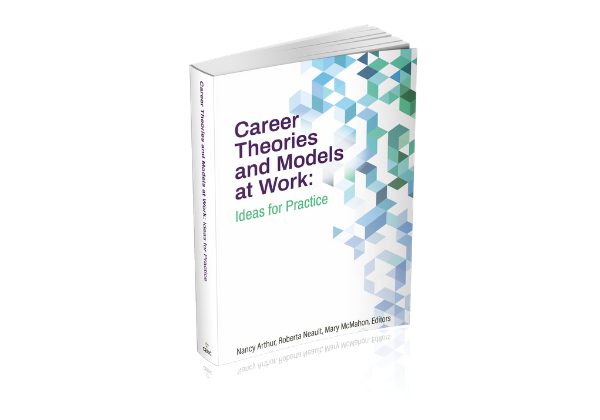International translations of Career Theories and Models at Work book to launch in 2021
CERIC’s Career Theories and Models at Work: Ideas for Practice will be breaking new ground this year, with plans to translate the popular book into Japanese, Latvian and Estonian. Once published, career service professionals around the world will be able to access the book in five languages, with a previously announced French edition slated for release in spring 2021.
The original English publication was released in 2019 and was edited by Nancy Arthur (University of South Australia), Roberta Borgen (Neault) (Life Strategies) and Mary McMahon (University of Queensland). It includes 43 chapters on the theories and models that define the practice of career development today, with contributors from four continents and nine countries.
A desire to equip career professionals with the latest counselling theories helped drive the translation project in Japan, which is being co-ordinated by the non-profit Institute for Japan Career Counseling.
“We have found that career theories introduced in the book, such as social constructivist theories including narrative, life design, systems theory and sociodynamic approaches, are practical and useful to career counselling in Japan,” says Shujiro Mizuno, Licensed Career Consultant, who is editing the translation.
The Institute for Japan Career Counseling plans to organize study sessions for career consultants to learn more about Career Theories and Models at Work. It also hopes to digitize the book, to increase accessibility for Japan’s more than 40,000 licensed career consultants.
In Latvia, plans to translate the publication came about through “a story of networking and co-operation,” says Ilze Jansone, Euroguidance Programme Manager for the Career Information and Guidance Department of the Euroguidance Network. Through the IAEVG (International Association for Educational and Vocational Guidance), Jansone learned that some of Euroguidance Network’s members had participated in the development of Career Theories and Models at Work.
“Bringing theory and practice together in educational and vocational guidance is an approach that the IAEVG is championing, and the book published by CERIC is a great tool in this respect,” Jansone says.
Career counsellors and career counselling students in Latvia will receive the book for free.
In Estonia, 300 copies of the translated Career Theories and Models at Work book will be distributed free to career specialists working for the Estonian Unemployment Insurance Fund, which is co-ordinating translation and distribution, as well as to career professionals working with partners such as the Association of Estonian Career Counsellors.
“In order to serve clients and develop career services, it is necessary for career specialists to be familiar with the most important and latest theories and models in the field,” says Lana Randaru, Methodology Consultant of Career Services, Estonian Unemployment Insurance Fund. “The collection provides a comprehensive overview of the theoretical approaches currently underlying career services and provides examples of their use in practice.”
Since the release of the English version of Career Theories and Models at Work in 2019 at the annual Cannexus National Career Development Conference in Ottawa, the book has been adopted in career counselling courses and used by practitioners globally. To further disseminate knowledge, CERIC has hosted free webinars with authors from the book over the past two years. CERIC will be offering another free webinar series starting March 29 with author Judi Miller, University of Canterbury New Zealand, presenting in English on the Solution-Focused approach, and authors Patricia Dionne and Audrey Dupuis of l’Université de Sherbrooke in Quebec delivering a French webinar on Cultural-Historical Activity Theory.
Visit ceric.ca/theories for information about how to purchase the publication in English.

